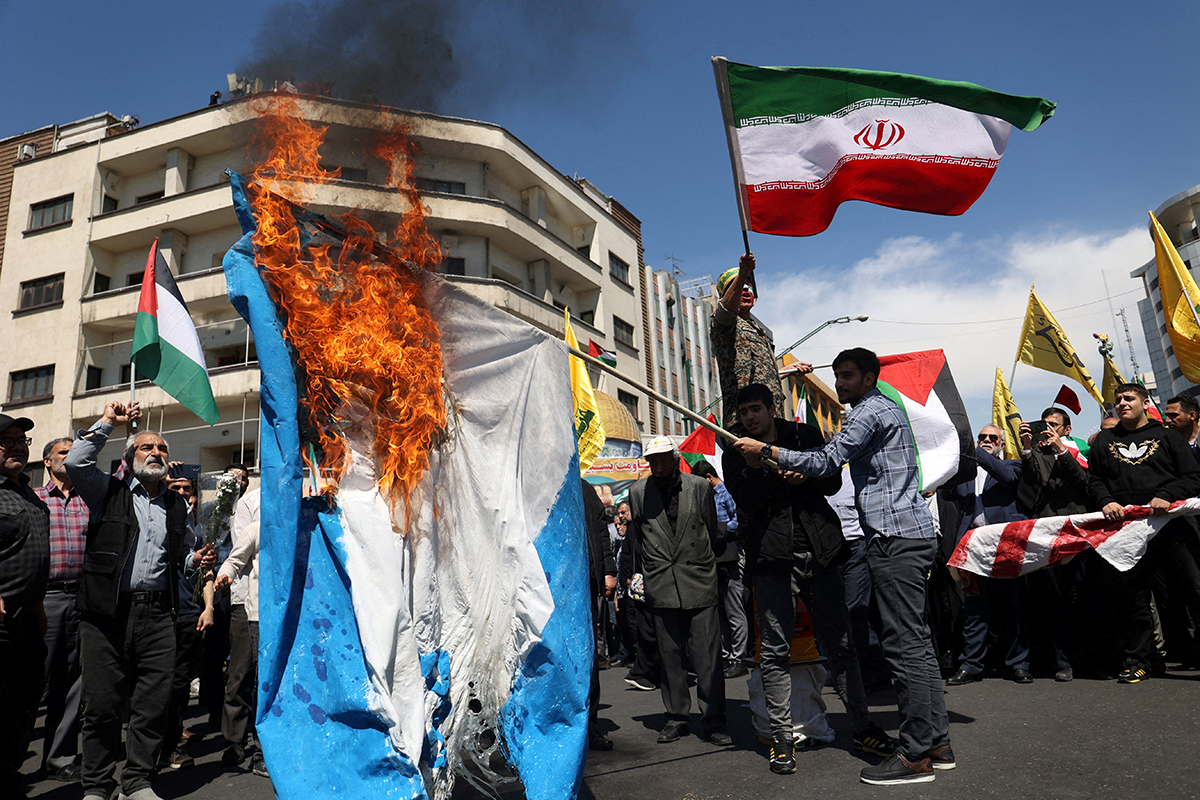Last week, the world woke up to the possibility of a wider war in the Middle East becoming even more imminent.
Iran’s attack on Israel, while the front in the Gaza Strip remains active, demonstrated how thin the line is between tension and conflict.
A regional conflict with the direct involvement of Iran and Israel would be the worst-case scenario, according to Ino Afentouli, Executive Director of the Institute of International Relations at Panteion University, in an interview with Phileleftheros. Particularly adverse consequences would be felt by Cyprus and Greece, which have invested significantly in improving their relations with Israel.
Due to the war, all other activities have halted, which is not positive, Ino Afentouli remarked. “Instability does not favour economic cooperation, development plans, or environmental protection, which is a critical issue for the Mediterranean,” she emphasised.
The repercussions are already being felt and will become even more pronounced if the situation deteriorates. There is no doubt, she stated, that we will witness more substantial migrant flows, with Cyprus, as a frontline state, bearing the brunt of the pressure, as was the case with the war in Syria. “It is a significant wound that is being inflicted by this conflict because the Mediterranean, the border of the European Union, neighbours the Middle East and Africa.”
For the two countries, Israel is a vital ally, and therefore, their solidarity should continue, she asserted. This does not imply that Nicosia and Athens do not support the just cause of the Palestinian people, but they must primarily safeguard their interests. “This does not mean that we do not support the rights of the Palestinian people. We advocate for the two-state solution, but international relations can be cynical, and it is crucial to look out for our interests,” she remarked.

Did Israel anticipate the consequences of striking Iran’s consulate in Damascus? And why do you think they proceeded with such a risky attack?
It is difficult to know what preceded this in terms of Israeli planning. However, we must remember that this is not the first time Israel has hit Iranian targets; it has happened many times in the past, targeting Tehran’s nuclear programme. The strike on Damascus was premeditated, not random. I believe it was intended to send a message to Iran to refrain from involving Hezbollah or the Houthi rebels in the conflict in the Gaza Strip. The Israelis must have taken into account the possibility of retaliation, as they possess a military apparatus with a track record of precision and success.
What would a full-blown conflict between Iran and Israel entail? How might a regional conflict evolve, involving Middle Eastern countries as well as non-state actors such as Hezbollah?
That would be the worst-case scenario. However, looking at things realistically, Iran does not have any allies in the region. It has Hezbollah, but it is a non-state actor. Hypothetically speaking, and I don’t believe this is a likely scenario if we have a regional war with Iran on one side and Saudi Arabia, the UAE, or Jordan siding with Israel, the balance will not tilt in Tehran’s favour. This is why, after the attack on Israel, Iran sent a message in all directions that it does not want the conflict to continue.
So, if a full-blown conflict is a remote possibility, how do you see the situation evolving?
I believe the unpredictable strikes between the two countries will continue. This is, in my opinion, the lesser of two evils. What we must consider is that this new front opened while the war in the Gaza Strip is still ongoing. Either logic will prevail, and Israel will opt for a strong military response, or it will heed the calls from the US and other countries for a diplomatic solution through negotiations. At this point, we cannot say with certainty which path will be chosen.
Are there any indications that Israel is planning to strike Iran’s nuclear facilities? And if it does, could it deliver a significant blow or merely further enrage the Iranian mullahs?
The destruction of Iran’s nuclear programme is a strategic goal for Israel. Therefore, from time to time, operations have been carried out against the programme, which cannot be openly attributed to Israel, and these have dealt blows to the development of the nuclear programme. Israel certainly has information about the level of advancement of the programme and the locations of the nuclear facilities. So, they might make such a move. However, if they are held responsible for such an attack, Iran will have every right to retaliate, which brings us back to square one. We will have to wait and see what happens. It is also possible that Israel might strike Iranian targets outside of Iran. Moreover, let’s not forget that there is an internal dispute within Israel between the hardliners and the less hardline politicians.
Who gains and who loses from the new flare-up in the Middle East, particularly the escalation of the crisis between Israel and Iran?
No one gains. Neither Israel nor Iran nor regional or global peace. If I were to make a theoretical assumption, I would say that the Chinese come out on top, as they can now position themselves as mediators for a potential solution. China maintains communication channels with both Iran and the Arab states.
How does Iran’s attack change the diplomatic balance? Specifically, Israel seemed cornered due to the intensity of its operations in the Gaza Strip, but now it seems to enjoy broad international support.
That is true. Israel has shifted from being the aggressor to the defender. Now, it can be argued that what it has been vocal about regarding Iran is proven in action, and thus, it has gained some diplomatic leverage. However, this will depend on how the situation unfolds—whether Israel engages in negotiations with the Palestinians, whether there will be a ceasefire in the Gaza Strip, or whether it accepts a proposed solution.
How are Cyprus and Greece affected by these developments? And what will happen if the crisis evolves into a regional conflict?
Unfortunately, both countries are significantly impacted because Israel is our primary ally in the region, and we must not forget that. Cyprus, Greece, and Israel have formed a tripartite alliance, and we must maintain this front. For us, Israel is a friendly nation, and the current situation in our region is unfavourable as it halts any efforts for economic development, exploitation of energy resources, and strategic cooperation. Therefore, our solidarity with Israel should continue. This does not mean that we do not support the rights of the Palestinian people. We advocate for the two-state solution, but international relations can be cynical, and it is crucial to look out for our interests.
If Iran decides to carry out its threat to strike countries that collaborate with Israel, could we see attacks on Cyprus and Greece?
I find it difficult to envision such a scenario because neither Cyprus nor Greece is an enemy state of Iran. Tehran’s primary focus is on other Arab countries, not Nicosia or Athens. They have no reason to turn against us. Moreover, regarding the possibility of the two countries becoming targets of strikes by pro-Israeli interests, I also consider that unlikely. Why would they target two European Union member states, one of which, Greece, is also a NATO member? If we reach that point, it means the situation has deteriorated drastically. However, with the migration issue, I believe we will have a problem, and this is a valid concern. If things worsen further, thousands of people will seek an exit from a dangerous region through Cyprus and Greece, as we witnessed during the war in Syria.
How will the security of Europe and frontline states, such as Cyprus, be affected?
They will be significantly impacted by the instability that arises. Instability does not favour economic cooperation, development plans, or environmental protection, which is a critical issue for the Mediterranean. It also does not promote regional collaboration, which is precisely what we need to tackle the existing severe problems. Unfortunately, with such a severe conflict ongoing, these partnerships cannot progress.
Have the developments in the region raised alarm bells in Brussels regarding European defence and security?
Absolutely. This conflict inflicts a significant wound as the Mediterranean, the border of the European Union, neighbours the Middle East and Africa. Countries within institutions like the EU must maintain stability, and fortunately, Cyprus and Greece are stable. However, as the gateway to the Middle East and Africa, we bear the brunt of the consequences. Let’s hope that these consequences won’t be dramatic. I trust that the EU will do what is necessary for its security. But you know, it’s not a simple task, nor can it be done swiftly. Currently, all member states possess capable armed forces, but they are not collectively held, unlike in NATO, where 32 countries share resources. It will take time for the EU to reach that level of integration, and we must also consider the upcoming European elections, the leadership transition later in the year, and the US elections in November.
How do you interpret the stance of the Arab states in the region? Could these developments be an opportunity for them to settle scores or gain leverage in the power struggle in the Middle East?
What we must understand is that we cannot disconnect this latest conflict from the war in the Gaza Strip. The root of this conflict lies in what is happening in Gaza over the last seven months. If we closely observe each Arab country, none of them has been particularly proactive in deterring Israel from its military operations. The Arab states are offering some diplomatic services, but they have not intervened on behalf of the Palestinians. Whether we like it or not, this is the conclusion. Moreover, we witnessed Jordan, during Iran’s attack on Israel on April 13, assisting Israel under the pretext of self-defence, as they believed their targets might also be hit.
And what are the reasons behind the lukewarm reaction from the Arab states?
On the one hand, there is rivalry with Iran, and on the other hand, the powerful Gulf countries, such as Saudi Arabia and the UAE, hold no sympathy for Hamas. They believe that the example set by Hamas should not be replicated or transferred beyond Palestinian territories. Everyone in the region fears Islamic extremism, and this is something Iran, as a Shiite Muslim country, fosters, while most other countries in the region are Sunni.
Wasn’t all this supposed to be about the struggle for the Palestinians? Do you see any gains, even something positive, for the Palestinian people from this situation?
Unfortunately, as events have unfolded, the Palestinian people are suffering dramatically, and no one knows what their future holds. There are pressures for a Palestinian state, but I believe this is off the table for at least the next year. Israel will not engage in discussions about a Palestinian solution before the US elections in November when they know who the next president will be.






